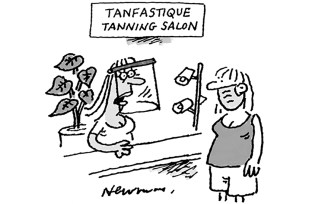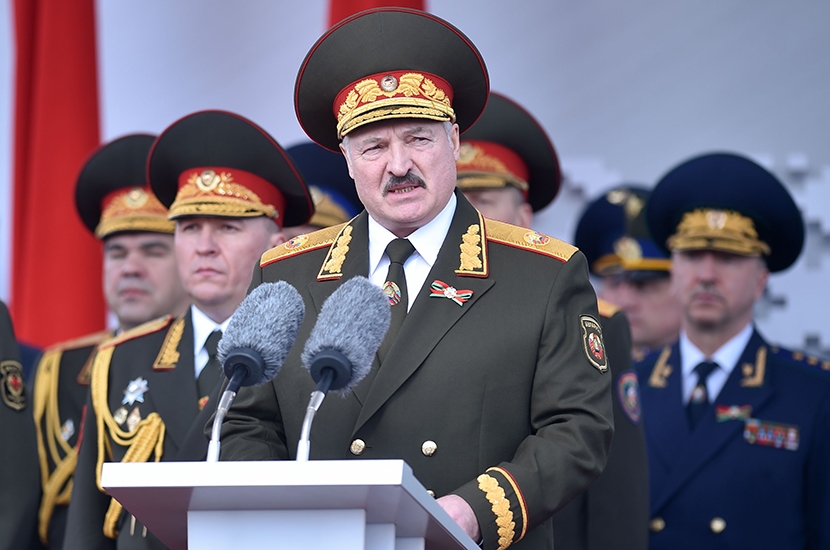Alexander Lukashenko, labelled by the Bush administration as ‘Europe’s last dictator’, was never going to go down without a fight. In his final public address before Belarus went to the polls he offered a thinly veiled warning to those who wish to remove him from power: ‘[Our Belarus] is rather naive and a little bit fragile but she is beloved and when you love something you do not give it up.’
On election day, Lukashenko delivered on his grim campaign promise. Official exit polls gave the incumbent an implausible 80 per cent of the vote: his fifth landslide in 26 years at the helm. The lion’s share of presumed electoral fraud happened before polls opened. State media announced that around 40 per cent of the electorate had opted to vote early. Opposition sources noted that if this was the case, then the voter turnout at certain polling stations would have been a miraculous 120 per cent.
When the polls closed, opposition supporters took to the streets and were met with force. Tear gas, rubber bullets, stun grenades and police batons were used in an attempt to disperse the protests that went on for days. As human rights abuses and police violence continued, they were shroud-ed in an information vacuum: reporters were bundled into vans and their cameras destroyed, and the internet in most of Belarus was cut off by the government. Despite this, there is a lingering optimism that Lukashenko can no longer hold on for ever. Is this campaign the beginning of the road that in five or ten years will lead to a democratic Belarus and perhaps even European integration?

First, it is important to understand how we got here. Belarus took a markedly different course from Russia and Ukraine when they became independent in 1991. Most Belarusians resented the collapse of the Soviet Union and decided to pretend it never happened. Lukashenko became president on this platform in 1994 after winning the first and only free election in the country’s post-Soviet history.
Lukashenko’s offer to the people of Belarus was simple. Look at the neighbours: they flirted with the West and privatisation and now they are overrun with oligarchs and gangsters. With him, people would have familiar, bearable poverty, a hard line on security, and most of the economy would remain in the hands of the state.
This social contract remained effective for almost two decades. But in the past ten years, economic stagnation paired with a better–educated youth that choose social media over state media has meant more Belarusians have become increasingly dissatisfied with Lukashenko’s brand of getting by. When Covid-19 struck in spring this year Lukashenko famously remarked it could be cured with vodka or a trip to a sauna. Belarus’s Premier League accumulated fans from around the world, as they were the only country bonkers enough to continue live football matches; but as Covid-19 deaths continue to rise the pandemic has exposed the consequences of authoritarian mismanagement even to his core elderly and rural supporters.
Over the past decade, Belarusians have become increasingly dissatisfied with Lukashenko’s brand of getting by
In May, as the build-up towards the presidential elections began and discontent intensified, a very Belarusian model of opposition emerged. Sergei Tikhanovsky, a YouTube star, gained a following for his videos calling out government mismanagement of the economy (including a $2 million public toilet that never opened) and mocked Lukashenko’s moustache by likening it to a cockroach. Soon protestors took to the street armed with slippers — the implement of choice for swatting cockroaches — and talk of a ‘slipper revolution’ began to shake Belarus. Before long, Tikhanovsky was jailed for holding ‘unlawful’ gatherings and his dreams of running for president were swatted instead. Two other credible opposition candidates, banker Viktor Babariko (now jailed) and former diplomat Valery Tsepkalo (who fled the country to avoid arrest), were also banned from the race.
On 14 July, Sergei’s wife, Svetlana Tikhanovskaya — a former teacher and now a stay-at-home mum — successfully registered as a presidential candidate to take on Lukashenko. Conspiracy theories abound as to why she was allowed into the race at all. Is she a KGB spy or a Russian agent? The most obvious explanation is simpler: he underestimated her. Flanked by Veronika Tsepkalo (wife of Valery) and Maria Kolesnikova (campaign chief for Babariko) Tikhanovskaya launched the greatest challenge to the regime in a quarter of a century. This triumvirate of women appealed to a much broader base, to people who only recently began to question the status quo. Tikhanovskaya never positioned herself as a pro-Europe, pro-West or pro-business candidate. Her demands were simple: hold free elections and release political prisoners, including her husband. She must now make these demands from neighbouring Lithuania, where she has fled for her children’s safety.
The great debates about language and history that emerged in Ukraine’s Euromaidan revolution of 2014 hardly factor in at all to the calls for democracy in Belarus. In fact, Tikhanovskaya’s greatest achievement is to prove to ordinary Belarusians — and Russians who are paying attention — that there is space in her brand of east Slavic democracy for those who are traditionally statist, patriotic and suspicious of the West. If protests become more violent over the weeks and months ahead, western powers must be vigilant in condemning human rights abuses and increasing sanctions against perpetrators. But if European powers begin to posture vocally about Belarus’s future as an EU partner, they could inadvertently narrow the opposition’s support base and damage its chances of removing Lukashenko in the long run. If Belarusian democracy is to blossom, it must retain its home-grown image.
It is rumoured that Putin’s hopes of ‘legally’ staying in power rely on becoming head of state of the ‘Union State of Russia and Belarus’, a supranational union formed in 1999 that until now has been little more than a trade and security agreement. As Lukashenko’s position in Belarus becomes untenable, Putin will want a stable government in Minsk, even if it is a semi–democratic one. Perhaps such optimism is verging on ‘rather naive and a little bit fragile’, like the Belarus in Lukashenko’s mind. In any case, Europe will not miss its last dictator when his day of reckoning finally arrives. In the words of Svetlana Tikhanovskaya: ‘We have already won, because we have overcome our fear, our apathy and our indifference.’






Comments